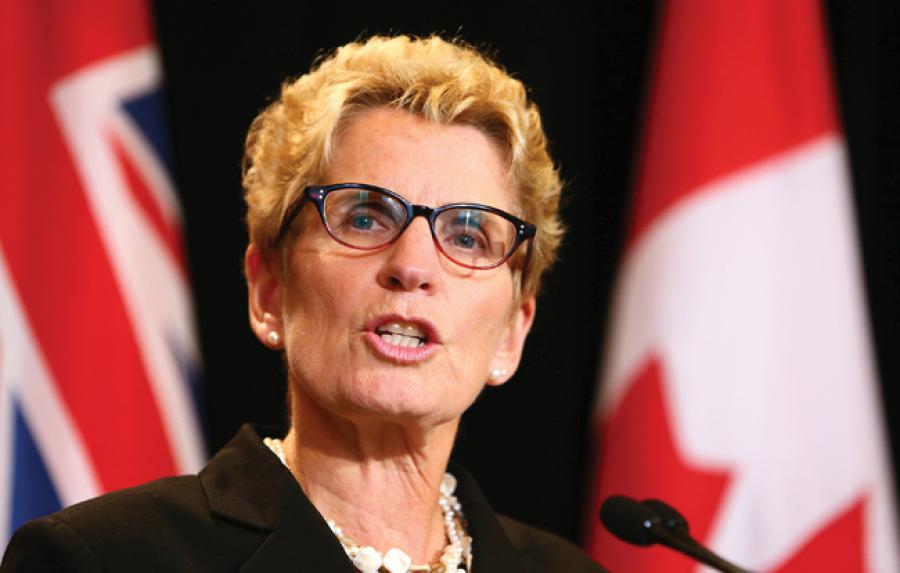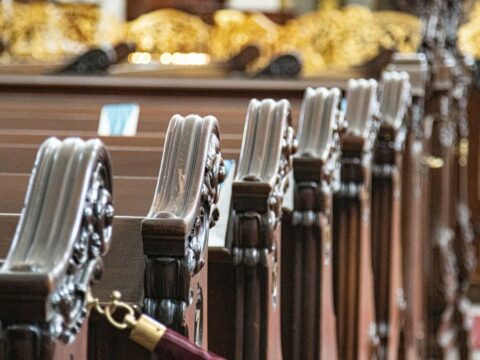In the mid-1960s, Rev. Harry MacKay blew through the doors of Richmond Hill United like a sudden squall on a calm lake. Declaring himself a “prophet” and determined to blast the comfortable suburban congregation out of its complacency with a revolutionary gospel that eschewed clerical formality and recommended premarital sex, MacKay boldly enacted the advice of his hero, U.S. political activist Saul Alinsky, “to agitate to the point of conflict.”
It worked so well that the young minister soon found himself fired by an outraged congregation. But he took his revenge in the form of a handful of sympathetic parishioners who left with him and, for a time, worshipped at an informal “house church” that moved every week from one private residence to another in the leafy and prosperous Ontario town north of Toronto.
You may unsubscribe from any of our newsletters at any time.
Among the dissidents and occasional house-church hosts were Dr. John Wynne and his wife, Patsy, shocked and saddened by the church’s reaction to MacKay’s challenge. Typical of the legions who have strayed from mainline churches over the subsequent half-century, they never returned to Richmond Hill United.
Entirely atypical was the reaction of the Wynnes’ eldest daughter, Kathleen, leader of Richmond Hill’s Christian Girls in Training and MacKay’s most enthusiastic and competent ally.
“Katie Boyce,” as MacKay dubs her in his fictionalized memoir, with her “blazing red hair and an infectious freckled-face grin,” was the one who made the folk masses and “Youth Happenings” work as well as they did.
But when it came to choosing sides, the future premier of Ontario made a surprising decision. Where her parents rebelled, young Kathleen stayed put, siding with the establishment and continuing to worship in the stately 85-year-old building.
With that impulse, Wynne set the course that ultimately steered her against every prediction into the highest political office of Canada’s largest province. As a determined reformer and a gay woman, she has repeatedly fought for her place in a resistant mainstream — refusing to be marginalized, demanding to belong. No word in Wynne’s vocabulary is more important than “inclusive.” And no quality is more important to her success than her unshakable allegiance to the ethical values of the militantly moderate United Church.
Speaking in her brightly lit oak-panelled office overlooking Queen’s Park and the Ontario legislature, Wynne remembers the Richmond Hill schism as “a very painful time in our house.” Her parents were excited by the young minister’s radicalism. “They loved to have somebody push them to break out of the mould that had existed,” the premier says. “But it caused a huge rift in the congregation. It got very personal and very nasty.”
Sounding almost surprised at the recollection, Wynne, now 61, adds, “I actually stayed in the church and continued on.”
Nearly 30 years later, Kathleen Wynne, a mother of three, found herself at the centre of another controversy, trying to explain to her shocked neighbours and fellow parishioners at Fairlawn Avenue United in North Toronto — the very heart of English Canada’s WASP establishment — why her lover, Jane Rounthwaite, had replaced her husband, Phil Cowperthwaite, in the matrimonial bed on Keewatin Avenue.
Wynne chronicled the drama in a column she was writing for the church newsletter, one that normally dealt with such matters as leaky roofs and sinking funds. “I talked about the reality of Phil and I and Jane trying to work out an arrangement where Phil was living across the yard from us, and we were in the house, and he would come in every morning and he would get breakfast for the kids,” the premier says.
Some friends melted away and others offered well-intentioned advice, according to Rounthwaite, who followed Wynne into the United Church at Fairlawn. “People kept saying [to Kathleen], ‘Why don’t you move downtown? Why don’t you run for the NDP?’” Rounthwaite recalls. “But she said, ‘No, I’m staying here because this is where I think I need to be.’”
As she had once been in Richmond Hill, Wynne at the time of her coming-out was deeply involved in the church community. “I had been very active, my kids had been christened in the church, so we were very well known to the community,” she says. “And I just carried on. I didn’t leave the church; I stayed, and we worked through it.”
“The North Toronto community was not exactly excited about us,” adds Rounthwaite. “But the church was really quite welcoming. The church was my point of entry.”
If Wynne’s refusal to be rejected was the driving force of her career in politics, Rounthwaite was the catalyst that launched it. They had met while students at Queen’s University in Kingston, Ont., in the 1970s. It was Rounthwaite, in fact, who introduced Wynne to Phil Cowperthwaite; she remained close to the couple throughout their marriage until it ended in the early 1990s, when Rounthwaite and Wynne began a relationship that would culminate in a 2005 wedding at Fairlawn Avenue United.
Unlike other political spouses, who are generally consigned to a minor role in the public lives of their other halves, Rounthwaite has been a big part of Wynne’s political career. She managed it personally in their early days and remains the premier’s closest political adviser. And while Wynne’s focus shifted from church to politics, Rounthwaite, a management consultant, leaned in — she’s currently working for The United Church of Canada as facilitator of the denomination’s Comprehensive Review restructuring process.
Wynne and Rounthwaite became a formidable political team — first by persuading the conservative voters of North Toronto to elect a gay school trustee 15 years ago, then by cracking the much-tougher nut of the Ontario Liberal Party. Like Wynne’s neighbours in North Toronto, many Liberals also felt this progressive lesbian belonged downtown with the NDP.
Wynne had earned notice as an effective leader of grassroots opposition to the divisive government of former Ontario premier Mike Harris when the Liberals first denied her, appointing 32-year-old rookie politician Michael Bryant to run in her home riding in 1998. The resistance persisted four years later when Wynne sought the Liberal nomination in nearby Don Valley West. Then, according to Rounthwaite, it was party official Greg Sorbara, a future Ontario finance minister, who held her at bay. “He wanted a star candidate,” she recalls. “Finally, some sensible people phoned him up and said, ‘Are you nuts? This is a star. Just give her the nomination.’”
Wynne proved the point with a career that became a virtual spree of giant-killing. She defeated Progressive Conservative cabinet minister David Turnbull to gain entry to the legislature, then faced what most observers considered to be certain defeat in the next election, when Progressive Conservative leader John Tory chose to run against her in Don Valley West. The result was a humiliating defeat for Tory, now mayor of Toronto.
Despite a sterling record as a minister in successive Liberal governments, Wynne was once again the underdog when she ran for the party leadership in 2013 following Premier Dalton McGuinty’s retirement. “Kath has had to prove herself over and over again,” Rounthwaite says. “I’m not sure a guy would have had to climb quite so many walls.”
Sealed by a brilliant platform speech, Wynne’s subsequent victory in a heated leadership contest was widely regarded as a poisoned chalice: the Liberal government she had inherited was weary, mired in scandal and lagging far behind the Progressive Conservatives in every opinion poll.
The word “stunning” appeared frequently in news stories describing the result of the 2014 Ontario election. The emergence of a robust Liberal majority out of the cold ashes of the McGuinty minority seemed miraculous to some. But in light of Wynne’s already remarkable career, it was more like business as usual.
Since then, pundits have struggled to explain the new premier’s appeal. Many still see it more in terms of the failure of her most recent high-profile opponent, former PC leader Tim Hudak. In any case, it isn’t easy to explain how a married gay woman could build an impregnable political base in socially conservative Don Valley West, Canada’s largest Muslim riding. Like Calgary Mayor Naheed Nenshi, Wynne is a strikingly modern politician who has succeeded by transcending the partisan and social categories that define a conventional political world view. The word that comes up most often in focus groups, according to Rounthwaite, is “authenticity.”
But that description stops short of identifying what values or personal qualities this most modern politician authentically represents. The paradoxical answer to that, according to the woman who knows her best, is Wynne’s staunch allegiance to the core values of the strait-laced Protestant church she refused to abandon in her youth.
“This is not just a job for her; it’s not a career,” Rounthwaite says. “It’s a calling. It speaks through her that this is where she is supposed to be, that this is what she is supposed to be doing. And that’s why people follow her.”
“As long as I’ve known her,” Rounthwaite adds, “she is so motivated to her core to do the right thing.”
The missionary impulse comes naturally to Wynne, whose family has a long history with the United Church. But it began accidentally, according to family lore, when Wynne’s great-great-grandfather, a diehard Presbyterian, went to a meeting in the 1920s to vote against joining the new United Church of Canada. “Willie Watson was his name — a very small little Scotsman,” says Wynne. He was in his early 90s at the time, determined to remain Presbyterian. But he returned from the meeting distraught. “Oh, Evie,” he is said to have confessed to Wynne’s grandmother, Eva, “I think I stood up at the wrong time!”
Willie Watson’s descendants have remained faithful to the United Church cause for generations. The ties frayed in the 1960s, but Wynne maintained her allegiance out of respect for Eva, Rounthwaite says.
‘It’s hard for me to separate my motivation to be in politics from my belief about why I’m on the planet.’
Learning politics in the United Church involved lessons directly applicable to her current job, according to Wynne. “I very much tried to work with my fellow congregants to find ways to make the best decisions for the church,” she says, “and at the same time to hold on to why we were coming to church in the first place, because it is so easy to get wrapped up in the new roof or hiring the new minister that you lose sight of what the mission of the church really is.”
Sometimes, she adds, “I wished we didn’t have any buildings, that we didn’t have any of those walls to hold us into that paradigm of talking about the upkeep.”
The same snares await secular politicians. “We can spend a lot of time in government worrying about the logistics and the minutiae, but it is also our responsibility to keep our eye on why we’re in government in the first place,” Wynne says. “We’re here to help people. We’re here to make things work better, not to get in the way of people’s lives.”
Like many others in the denomination, Wynne espouses a faith that would barely register as religion in many minds. “The church is not organized religion; the church is the spiritual connection that we foster through our faith,” she says, adding that the United Church is only one version of that connection. “When I go to an Anglican church or a mosque or a synagogue, it’s the same — people coming together looking for a way to connect spiritually and find some meaning beyond this planet and where we are today.”
She detected a similar spirit when she visited the avowedly atheist congregation of West Hill United in east-end Toronto to speak about her life as a gay woman. “To be perfectly honest, I didn’t feel that different from when I was in other churches,” she says. “There was obviously less Bible, less Gospel, but in terms of the quest people were on, and the need for support and community belonging, that was the same. That’s a fundamental.”
“It’s hard for me to separate my motivation to be in politics from my belief about why I’m on the planet,” Wynne adds. In both cases, “the imperative is giving back.”
A strong religious feeling that discourages exclusive beliefs may have contributed to the general decline of liberal Protestantism over the past half-century, but it has served as the secret to success for more than one politician in polyglot Don Valley West. Prior to his defeat in 2011, the riding was represented federally by Rev. Rob Oliphant, an openly gay, married United Church minister and longtime Wynne supporter.
“Her motivation to be in public life is rooted in that United Church background,” Oliphant says, even though few think to notice it. “And that’s very typical of the United Church: you don’t name it; it just is.” But it works.
Oliphant recalls the most frequent objection he heard when trying to persuade delegates to support Wynne at the provincial Liberal leadership convention: “People would say, ‘Aren’t you worried that she can’t win in Bancroft or Leamington? How can we sell a highly urban, educated lesbian in rural Ontario?’” In reply, Oliphant described the ease with which Wynne moved among “Afghan women or Gujarati men” in the highrise Muslim enclaves of Flemingdon and Thorncliffe located in her riding.
Wynne’s unlikely triumph in the subsequent election more than proved the point. “Strangely, Leamington and Bancroft are more like Flemingdon and Thorncliffe than they are like Rosedale and North Toronto,” Oliphant says.
He still marvels at Wynne’s ability to cross cultural barriers. “I’m guessing we’ve done a hundred events together, and there’s no one who can move into a room and be as appropriate as she is in every way — in the way she’s dressed, in her body language, in her manner,” Oliphant says. “You can’t learn that.”
Yet Wynne is no saint. She is intensely competitive. In politics, that can be a weakness as well as a strength. “We all have our shadow side,” Oliphant says, worrying that the will to win could ultimately cloud the premier’s judgment. “I haven’t seen it yet, but a premier has to stop being competitive at some point.”
Rounthwaite is less concerned. Trained since childhood in community service, Wynne remains “a very humble person,” she says. “This job has not gone to her head. That’s not going to happen. It’s my job to make sure it doesn’t, but I’m really not worried. There’s some people who wear the mantle of power with grace and humility and other people who don’t.”
Few who know Wynne would dispute Rounthwaite’s assessment of her spouse’s character. Canada’s first gay, female premier came to power as the exemplar of old-fashioned yet persistent Christian values of conciliation and inclusiveness. Politics is never predictable, but the lesson of Wynne’s career to date — that moral leadership still matters — is a powerful message for the new century.













